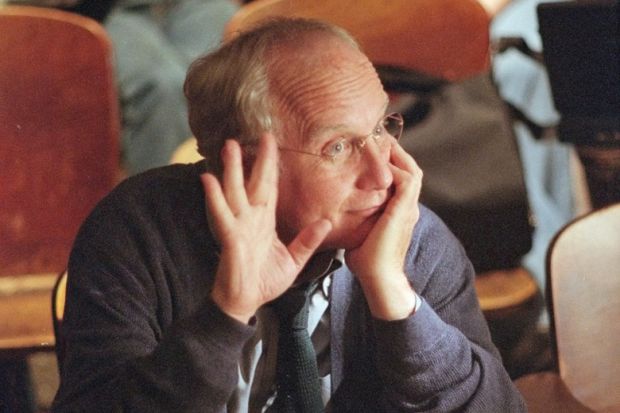Do television dramas reflect reality? This question might be asked by academics in light of a study that finds that US TV series typically depict scholars as lonely alcoholics whose main interest in their students is sexual.
Barbara Tobolowsky, associate professor in educational leadership and policy studies at the University of Texas at Arlington, analysed 12 series produced between 1996 and 2014 that were set, in whole or in part, in a higher education institution and found that few of the “primetime professoriate” had a happy home life.
Dr Tobolowsky says that they were often portrayed as having a drink problem, such as the title character in The Education of Max Bickford, a history professor; and as being single and lonely, for example, physicist Dick Solomon in 3rd Rock from the Sun, teachers at Adam's College in Sabrina, the Teenage Witch, and Max Bickford again.
Promiscuity among academics was another common theme, evident in Max Bickford, 3rd Rock and Sabrina, as well as Boy Meets World, set in a fictional liberal arts college called Pennbrook University.
Dr Tobolowsky argues that “non-traditional lifestyles” were sometimes used in US series to suggest a lack of integrity in scholars.
Significantly, students were often targets of academics’ amorous advances: in Boy Meets World and Max Bickford, as well as in Felicity, which followed a sheltered Californian teenager to the fictional University of New York, and Moesha spin-off The Parkers, set in a Californian university.
Dr Tobolowsky says that, beyond affairs, it is difficult to find television academics showing much interest in their students, whom they describe using terms such as “morons” and “idiots”.
Some academics go further. In 7th Heaven, which features a student attending the fictitious Crawford University, a lecturer returning exam scripts tells the class: “For those taking organic chemistry as a requirement for pre-med, you might want to double major in pre-law, because if you don’t understand chemistry, you’re going to be a doctor who’s going to need a lawyer.” In Buffy the Vampire Slayer, a psychology professor goes so far as to head a vigilante group in an attempt to kill the title character.
Academics’ relations with fellow intellectuals seem little better. In 3rd Rock, Dr Solomon – an alien – is seen reading A Brief History of Time by Stephen Hawking before remarking that “people on this planet will swallow anything” and tossing the book aside.
Few of the academics appear to be conducting research, yet that does not stop them being contemptuous of colleagues’ efforts, with the title character in Max Bickford silencing a peer by telling him: “Rex, the day you start to teach something other than ‘Cavalier literature in the antebellum South’ is the day I start to care what you think.” But, Dr Tobolowsky says, Dr Bickford has not updated his syllabus for 20 years.
Dr Tobolowsky told Times Higher Education that intellectuals in the US were “commonly viewed as shady, deceitful, pompous and self-interested”.
“I believe that the [on-screen] representations both represent public views and reinforce them,” she said. “It isn’t clear which came first, but the television images are strong, consistent and oft-repeated.”
Dr Tobolowsky’s study will appear in a forthcoming book that she has co-edited with Pauline Reynolds, an associate professor in education at the University of Redlands, titled Media Representations of American Higher Education: The Anti-intellectual University and Other Depictions.
POSTSCRIPT:
Print headline: TV scholars: drunk, lonely and lecherous?
Register to continue
Why register?
- Registration is free and only takes a moment
- Once registered, you can read 3 articles a month
- Sign up for our newsletter
Subscribe
Or subscribe for unlimited access to:
- Unlimited access to news, views, insights & reviews
- Digital editions
- Digital access to THE’s university and college rankings analysis
Already registered or a current subscriber? Login






